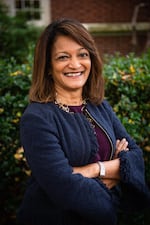
(Left to right) Democratic Party primary candidates for Oregon’s 3rd Congressional District Maxine Dexter, Eddy Morales and Susheela Jayapal.
Photos courtesy of the campaigns / OPB
Oregon is getting national attention this year because of a handful of races that could be competitive enough to decide which party controls Congress next January.
The contest Democratic voters in Oregon’s 3rd Congressional District will decide in the May 21 primary is not one of them.
Stretching from Portland’s east side to Hood River, the district is up for grabs for the first time in nearly three decades as longtime U.S. Rep. Earl Blumenauer heads toward retirement.
And while more tightly divided districts in the state will be closely watched in November, all the excitement in the ultra-liberal 3rd revolves around which Democrat will clinch the nomination — then a potentially lengthy congressional career when they cruise to a likely victory in the fall. Democratic registrations in the district outnumber Republicans by more than 3-to-1.
“Like a lot of districts around the country, this is one where paying attention in the primary race is going to make all the difference in terms of who actually gets elected,” said Chris Shortell, an associate professor of political science at Portland State University.
Three people with previous elected experience are leading contenders for the seat: Maxine Dexter, a state representative and critical care doctor; former Multnomah County Commissioner Susheela Jayapal; and Gresham City Councilor Eddy Morales.
Good luck finding daylight between the candidates on most issues. All three are self-described progressives who talk up their support for expanding access to health care, warn darkly of the threat to democracy posed by Republicans, want to do more to battle climate change and defend abortion rights, and urge the federal government to take a larger role in easing the housing crisis plaguing Oregon and many other states.
Related: How homelessness started, grew and became a statewide crisis in Oregon
The three have instead sought to differentiate themselves by touting their vastly different backgrounds and the experience they’d bring to the office. Those are the same factors that might help dictate how much independent spending from national super PACs is injected into the race, a variable that could be hugely important in what voters hear about the candidates.
“When you’ve got an open seat race where there’s not a really obvious successor, those tend to be the most interesting races,” Shortell said. “They tend to be the races where you see the most money spent put into it in the primaries.”
Beyond the three frontrunners, four candidates are running in the Democratic primary: Michael Jonas, Ricardo Barajas, Nolan Bylenga and Rachel Rand. Only Jonas, a Portland attorney, has reported raising any money toward his bid — roughly $15,700 to date.
Maxine Dexter
Dexter, the state representative, wastes no time in any campaign appearance to sell herself as a physician who brings a scientific mind to problems and who’s shown she can pass major policies.
“My campaign is built on a career of listening and caring for our community and using my proven skills and consensus building and leadership,” Dexter said recently at a debate organized by the Portland Metro Chamber, the city’s main business coalition.
Dexter, 51, grew up in Bothell, Washington, and was the first member of her family to attend college. She credits the income from a union-represented grocery store job with allowing her to afford her education.
A pulmonologist at Kaiser Permanente, Dexter first won office in the Oregon House in 2020, in the teeth of the COVID-19 pandemic. She was driven to run then, she said, after former President Donald Trump began nominating anti-abortion justices to the Supreme Court. The 2018 confirmation hearings of Justice Brett Kavanaugh, during which a woman who said she’d been sexually assaulted by Kavanaugh decades ago was peppered with questions, were the ultimate impetus.
“It really was the feeling of despair and frustration with Kavanaugh and what was happening with reproductive rights and Trump being in office and just feeling like, ‘If not me, who?’” Dexter told OPB in a recent interview. “I had the ability and the background to lean into that space.”
Dexter’s aim of influencing Congress extends much further back. She said she told an admissions committee at the University of Washington medical school three decades ago that “at some point in my life I would go to Congress and I would make health policy change.”

FILE - Oregon Rep. Maxine Dexter, D-Portland, at the Capitol in Salem, Ore., Feb. 5, 2024. Dexter is a physician who won election to the state House of Representatives in 2020.
Kristyna Wentz-Graff / OPB
In the Legislature, Dexter was tapped in 2022 to chair a committee dealing with housing and homelessness. In that role, she had a hand in passing spending and policy packages aimed squarely at the state’s housing crisis.
Her work on a 2023 policy aimed at holding cities accountable for adding necessary housing units is Dexter’s proudest legislative accomplishment. She also pushed a 2023 bill aimed at expanding access to the opioid-overdose reversal drug naloxone.
The lawmaker said she’s shown the ability to work across the aisle, though she’d be facing a far different political dynamic in the tightly divided U.S. House, where political maneuvering often trumps actual policymaking.
“My kids don’t understand why I would want to go because they don’t believe government works,” said Dexter, who has two teenagers. “That is exactly the reason that I believe we need to go to Congress.”
Dexter has support from many of her legislative colleagues, along with a number of labor unions and political committees associated with medical groups. Former Govs. John Kitzhaber and Ted Kulongoski have both endorsed her.
Related: Rush of outside spending turns heads in contest to replace Blumenauer
She’s trailed Morales and Jayapal in fundraising, but that might not matter. The 314 Action Fund, a super PAC that can unleash an unlimited amount of “independent expenditures” not affiliated with Dexter’s campaign, has spent more than $1.2 million in ads that, so far, have promoted the candidate as an “experienced progressive.”
That language is nearly identical to talking points that Dexter has posted on her campaign website, along with b-roll footage designed to be freely available to super PACs without technically counting as coordination under federal election law.
The 314 Action Fund backs candidates with a background in science and has supported Dexter since she ran for the statehouse in 2020. Its outsized spending on her behalf in the primary could be a potent weapon in her favor — one she said she’s grudgingly happy to have.
“I’m grateful for them investing in this race,” she said. “I will also just be clear: I’m committed to working earnestly when elected on federal campaign finance reform.”
Susheela Jayapal
Jayapal, 61, grew up in India, and came to the U.S. to attend college at the age of 16. She graduated from Swarthmore College in Pennsylvania and got a law degree from the University of Chicago.
Professionally, she worked briefly as an analyst for Goldman Sachs before turning to a legal career that culminated in four years as general counsel for Adidas at its North American headquarters in Portland. In 2000, she left paid employment and spent nearly two decades in volunteer roles on nonprofit boards while raising her two children.
“Even when I was in the corporate world, I was doing pro bono work,” she said in an interview. “I was doing free legal work. I represented people who were applying for asylum … And over time, I just realized that that was where I wanted to place my efforts.”
She was elected to the Multnomah County Board of Commissioners in 2018, and spent five years on a body grappling with COVID response and a worsening homelessness crisis. Jayapal said her proudest achievement from that time is helping expand access to long-term rent assistance for low-income residents, but she was criticized by the Oregonian/OregonLive editorial board for not taking a more forceful hand in steering a county board that has at times looked adrift.
Related: Oregon has an extreme housing shortage. Here's what could be done
To those critiques, Jayapal said her influence as a commissioner was limited in the county, where power is concentrated with the board chair. But Jayapal said she was engaged.
“I feel like there’s a desire … on people’s part to have commissioners or elected officials standing on a street corner and chastising the institution,” she said. “I just didn’t think that was going to work. I’m an advocate, but I’m also a really practical person.”
Jayapal stepped down to run for Congress earlier this year and has been considered a formidable candidate in part because of a close family connection. Her younger sister, Pramila Jayapal, is a four-term Democratic congresswoman from Seattle and chair of the Congressional Progressive Caucus.

FILE - Susheela Jayapal on Oct. 23, 2019, in Portland, Ore. Jayapal won election to the Multnomah County Commission in 2018. She stepped down from the position to run for Congress.
Cheyenne Thorpe / OPB
Susheela Jayapal has secured endorsements from nationally known progressive politicians, including U.S. Sen. Bernie Sanders, an independent from Vermont. She’s also got backing from climate groups, including the Sierra Club.
“I am the strongest progressive in this race on a range of issues,” Jayapal said at the Portland Metro Chamber debate. “What that means to me is that I will fight for big policies that will create real change.”
Jayapal’s list of priorities includes items like a Green New Deal and adopting a single-payer health care system, notions that have long been on progressives’ to-do list. The former corporate lawyer also argues that corporations need to be taxed at a higher rate.
Jayapal’s progressive backing is potentially an asset in a primary race in which only Democrats will be voting. But it could also garner her negative attention.
Pro-Israel political groups like the American Israel Public Affairs Committee, or AIPAC, have shown an appetite for launching ad campaigns against progressive Democrats this year. A super PAC affiliated with AIPAC poured more than $4 million into opposing a progressive Democrat in California earlier this year, without success.
Political observers are keeping an eye out for similar attack ads to emerge against Jayapal, who appears to be bracing for them.
“In one of the most prominent foreign policy issues of our time, I am the candidate who has earliest and most consistently called for a ceasefire in Gaza,” she said.
Eddy Morales
Morales, 44, often leads campaign appearances by recounting his deep personal experience with a variety of the nation’s thorniest issues.
There is immigration: His mother came to the U.S. from Mexico in the trunk of a car before Morales was born. She was eventually blocked from returning to the U.S. after making a trip to visit her dying mother.
There is gun violence: Two of Morales’ brothers were shot and killed in separate incidents. One was murdered at 17, when a gunman opened fire on a group in a park, Morales said. The other was the apparent victim of a robbery more recently in Mexico.
And there is addiction: His sister became hooked on pain pills after suffering a workplace injury and ultimately died struggling with an opioid addiction.
“Those have been the motivations for me,” Morales said in April at the Portland Metro Chamber debate. “I get up every day, and I try to ensure that I’m passing public policy and making changes that no other family, none of you in this room ever have to experience what I’ve gone through.”

Gresham City Councilor Eddy Morales, 44, in an image provided by the campaign. Morales won election to the Gresham City Council in 2018, and said he’s most proud of work that led to hundreds of units of affordable housing, along with efforts to stem gun violence.
Courtesy of the campaign
Morales came to Oregon at the age of 6 and spent much of his childhood in Portland. After graduating from the University of Oregon, he lived for roughly 12 years in Washington, D.C., working in a variety of political nonprofit and organizing roles. He advocated for students, spent time on issues associated with poverty and worked to engage Latino voters — work that he said brought him to states like Florida, Ohio and Georgia.
In 2016, Morales returned to Oregon, moving to Gresham with his husband. After Donald Trump was elected president, Morales founded the group East County Rising, which works to elevate candidates of color in eastern Multnomah County and these days touts the potency of its endorsement.
He also got involved with the Democratic Party of Oregon and was the party’s treasurer in 2022, when it accepted a $500,000 from Nishad Singh, a former high-ranking executive at failed cryptocurrency exchange FTX. The contribution was incorrectly recorded as coming not from Singh but a Las Vegas financial institution, prompting an investigation and, ultimately, a $15,000 fine from the state.
“I think everyone feels horrible that millions of people were taken advantage of and impacted by that,” Morales said, noting that Singh had spent FTX customers’ money on political contributions in other parts of the country. “We were tricked just like many others in this country were.”
Morales won election to the Gresham City Council in 2018, and said he’s most proud of work that led to hundreds of units of affordable housing, along with efforts to stem gun violence.
“When I first joined, my council was not very supportive of affordable housing,” he said. “People thought that it was going to attract poor people ... Yet, I was able to lead our council to building over 400 affordable housing units.”
Today, Morales pitches himself as the most experienced candidate in the race when it comes to forging the relationships that can lead to progress in Washington, D.C.
He has endorsements from the Oregon Education Association, along with Stacey Abrams, the Georgia political organizer and former Democratic gubernatorial candidate with whom he worked for a time in Georgia.
“I have been effectively doing this work for 25 years — nationally and here — and I think that’s what really sets us apart,” he told OPB. “I’m coming to this position, unlike any of my opponents, with those experiences … that will help get things done.”
